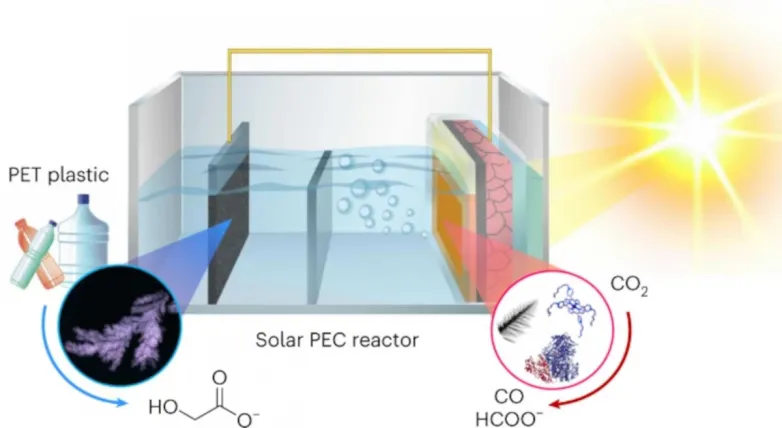Perovskite absorbers enable solar-powered system that converts plastic as well as greenhouse gases into sustainable fuels
- Researchers from the University of Cambridge have actually developed a system that can change plastic waste and also greenhouse gases into sustainable fuels and various other valuable products-- utilizing power from the Sun. The team mentions that this is the first time that a system that can convert two waste streams into 2 chemical products at the same time has actually been achieved in a solar-powered reactor.

The reactor converts carbon dioxide (CO2) and plastics into different products that are useful in a series of sectors. In tests, CO2 was converted into syngas, a key foundation for sustainable fluid fuels, and also plastic bottles were exchanged glycolic acid, which is extensively used in the cosmetics industry. The system can quickly be tuned to produce different items by transforming the type of catalyst utilized in the reactor. The incorporated reactor, which utilizes a light absorber based on perovskites, has two separate compartments: one for plastic, and also one for greenhouse gases.
The team achieved a versatile photoelectrochemical platform for CO2 conversion that is paired to the changing of plastic. The perovskite-based photocathode enables the assimilation of different CO2-reduction catalysts, which create different results.
" Converting waste into something helpful utilizing solar power is a significant goal of our research," stated Professor Erwin Reisner from the Yusuf Hamied Department of Chemistry, the paper's elderly author. "Plastic air pollution is a substantial problem worldwide, and also commonly, a number of the plastics we throw into recycling containers are blazed or wind up in garbage dump." Reisner additionally leads the Cambridge Circular Plastics Centre (CirPlas), which aims to get rid of plastic waste by incorporating blue-sky thinking with practical steps.
Various other solar-powered 'recycling' modern technologies hold assurance for resolving plastic contamination and also for lowering the quantity of greenhouse gases in the ambience, however to day, they have actually not been integrated in a single procedure.
" A solar-driven innovation that can aid to attend to plastic contamination as well as greenhouse gases at the same time could be a game-changer in the development of a circular economic situation," claimed Subhajit Bhattacharjee, the paper's co-first author.
" We additionally require something that's tuneable, to ensure that you can easily make changes relying on the final product you want," stated co-first author Dr Motiar Rahaman.
The team created different catalysts, which were incorporated into the light absorber. By altering the catalyst, the researchers can then change completion item. Tests of the reactor under normal temperature and also stress problems revealed that the reactor can efficiently convert PET plastic bottles and also CO2 right into different carbon-based fuels such as CO, syngas or formate, along with glycolic acid. The Cambridge-developed reactor produced these items at a price that is additionally much greater than traditional photocatalytic CO2 reduction procedures.
" Usually, CO2 conversion requires a lot of energy, but with our system, primarily you simply shine a light at it, and also it starts converting harmful products into something beneficial as well as sustainable," claimed Rahaman. "Prior to this system, we didn't have anything that might make high-value items selectively as well as successfully."
" What's so special regarding this system is the versatility and also tuneability-- we're making fairly simple carbon-based molecules right now, yet in future, we could be able to tune the system to make much more complicated items, just by changing the catalyst," said Bhattacharjee.
Reisner lately received new funding from the European Research Council to aid the development of their solar-powered reactor. Over the following five years, they hope to further create the reactor to produce more complex molecules. The researchers claim that comparable methods can at some point be utilized to establish an entirely solar-powered recycling plant.
" Establishing a circular economic climate, where we make helpful things from waste as opposed to throwing it into land fill, is crucial if we're going to meaningfully resolve the environment crisis and protect the environment," said Reisner. "And also powering these solutions making use of the Sun implies that we're doing it cleanly as well as sustainably."
Also read

